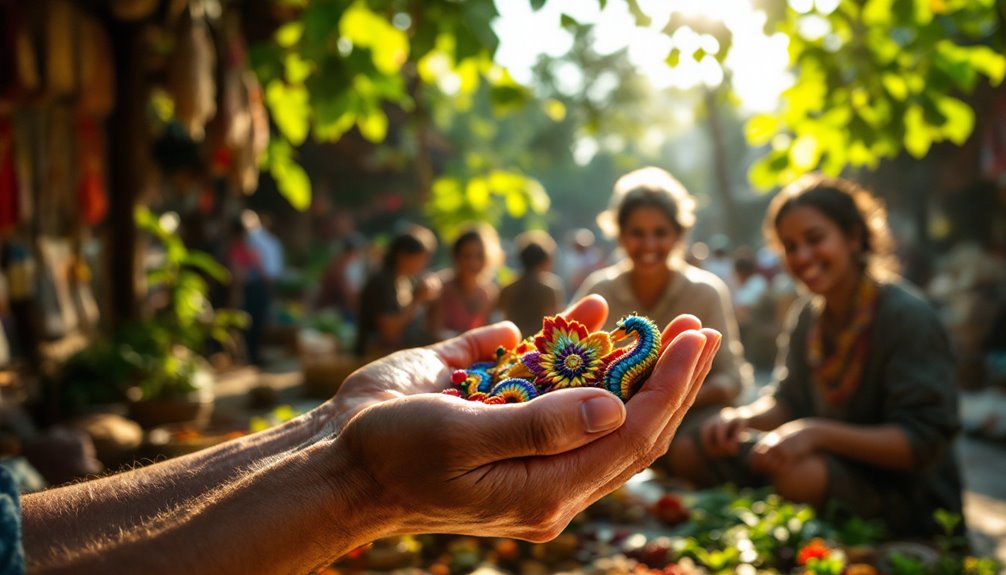You could write a novel about poverty in developing countries and still scratch the surface of its complexities. It's essential to approach this topic with care, ensuring you don't just amplify the voices of the privileged but instead highlight the nuanced experiences of those living in these realities. By understanding your ethical responsibilities and recognizing the systemic factors at play, you can create a narrative that's respectful and impactful. But how do you navigate the fine line between storytelling and exploitation?
Understanding Poverty's Context
Understanding the context of poverty is vital for addressing its complexities effectively. When one explores the world of poverty, you'll quickly notice the socio-economic influences at play. Low wages and high unemployment rates can trap families in a cycle of hardship, impacting their children the most. It's heartbreaking to see that nearly half of those living in extreme poverty are children, especially in regions like sub-Saharan Africa and South Asia, where access to basic needs like food and clean water is limited.
You might also notice how factors like gender and geographic location make certain groups more vulnerable. For instance, women and girls often face added challenges due to social norms and gender inequalities, which can deepen their struggle. Climate change is another layer, affecting agricultural stability and driving families to migrate in search of better living conditions. Approximately 333 million children live in extreme poverty, surviving on less than $2.15 a day, highlighting the severity of this issue.
In this complex landscape, understanding child vulnerability is vital. As you investigate poverty, remember that it encompasses not just numbers; it's about real lives impacted by economic, social, and environmental forces. So, let's break it down together, and uncover the stories behind the statistics.
Recognizing Ethical Responsibilities
Recognizing ethical responsibilities in addressing poverty is essential for fostering a more just world. You might not realize it, but rich nations have a moral obligation to help poorer countries. It's like a cosmic law of fairness—where benefits and burdens should be shared, not hoarded. Just think, a few small sacrifices from wealthier countries could save lives and prevent suffering. That's a win-win, right?
Now, let's explore collective responsibility. We all share the weight of poverty's burden, especially when resources are unevenly distributed. It's a bit like a group project—if one person doesn't pull their weight, everyone suffers. Education and equal access to resources are crucial tools in this fight, helping to bridge the gap and promote social harmony. Equitable access to education is essential for poverty eradication and personal dignity.
Also, remember that systemic issues like racism or classism can keep cycles of poverty spinning. So, whether you're a researcher, policymaker, or just someone who cares, keep these principles in mind. By recognizing our ethical responsibilities, we can engage in meaningful conversations and actions that challenge the status quo. Together, we can make a difference—one step at a time.
Avoiding Stereotypes and Misrepresentation

Stereotypes and misrepresentation can distort the realities of poverty, leading to harmful misconceptions. When you write about poverty, it's essential to use self-descriptive language. Let people describe themselves in their own terms, rather than labeling them with broad, dehumanizing categories. Instead of saying "the poor," try "people experiencing economic hardship." This subtle shift emphasizes their humanity.
Being precise matters, too. Avoid vague terms like "poverty-stricken" that can perpetuate stereotypes. Instead, focus on specific experiences and conditions that illustrate the complexities of poverty. And hey, while you're at it, be aware of your implicit biases. Recognize that racial, ethnic, and gender stereotypes can creep into your writing, often without you even noticing. Querying subjects about their preferred descriptors can lead to more accurate and respectful representations.
Document the unequal obstacles faced by different groups, like women or communities of color, rather than falling into the trap of the "new poor" versus "old poor" narrative. Remember, poverty isn't just a personal failing; it's often tied to systemic issues. Illustrating these systemic causes provides a richer, more accurate picture that challenges misconceptions and fosters understanding. Writing ethically about poverty is all about respect, nuance, and authenticity.
Highlighting Local Voices and Solutions
Amplifying local voices is fundamental when discussing poverty, as it brings authenticity and depth to the narrative. By incorporating direct testimonies from those living in poverty, you allow their experiences—filled with humiliation, shame, and grief—to shine through. This not only highlights their multidimensional well-being but also shows the distinction between material absence and social well-being.
Empowering local journalists, particularly women, is another significant step. Supporting programs that train them helps promote community solutions and guarantees that local issues are covered accurately. Local journalism acts as a powerful tool for development, fostering transparency and trust. Sustainable Development Goals emphasize the critical role of local voices in addressing poverty through inclusive strategies.
Integrating human rights perspectives into your writing is essential, as it aligns poverty reduction with principles that promote inclusion and equity. When you emphasize the right to self-determination and participation, you empower people to be actors in their own development.
Lastly, focusing on community-specific solutions recognizes that poverty isn't a one-size-fits-all scenario. Tailoring strategies to local needs builds resilience against economic, social, and environmental shocks. So, when you write, remember: local voices matter, and they hold the keys to genuine solutions.
Promoting Accurate Data and Research

Accurate data and research play an indispensable role in understanding poverty and crafting effective solutions. You might think data collection is just about numbers, but it's so much more than that. It's about capturing the real experiences of individuals living in poverty, especially after the pandemic. Surprisingly, there's a significant lack of post-pandemic data, which makes it tough to assess the current state of poverty for nearly one billion people.
When it comes to data representation, it's vital to guarantee that we include the voices of vulnerable groups who often get overlooked, like the unhoused. After all, if data doesn't reflect everyone's reality, how can it guide meaningful change? Researchers should also be aware of their biases and motivations, which can unintentionally distort the findings. As of 2023, approximately 1.1 billion people live in acute multidimensional poverty, underscoring the need for comprehensive data to address this issue effectively.
Using reliable sources, like the World Bank's Poverty and Inequality Platform, allows you to access extensive data while safeguarding ethical practices. Keep in mind that presenting this data with respect and dignity is key. By promoting accurate data and research, you help create a clearer picture of poverty, paving the way for solutions that genuinely address the needs of those affected.
Advocating for Sustainable Change
While it's easy to focus on immediate relief efforts, advocating for sustainable change is essential to break the cycle of poverty. You can make a real difference by promoting community engagement and policy advocacy. Think about it: improving access to sustainable livelihoods isn't only about giving aid; it's about enhancing entrepreneurial opportunities and investing in rural infrastructure. When communities are involved in these initiatives, they're more likely to succeed and thrive.
Additionally, providing universal access to basic social services like education and healthcare creates a solid foundation for growth. It's not solely about addressing immediate needs; it's about ensuring that everyone, especially vulnerable groups, has equal rights to these essential services. Statistics reveal significant disparities in care work contributions between genders, raising economic concerns that need to be addressed for equitable access.
You also need to tackle structural obstacles that keep poverty alive, like inequality and climate vulnerability. By doubling down on the Sustainable Development Goals, you can help create a more inclusive society.
Lastly, international cooperation is key. Mobilizing resources and building sound policy frameworks helps developing countries implement effective poverty eradication programs. So, let's roll up our sleeves and advocate for meaningful change that lasts. After all, who doesn't love a good underdog story with a happy ending?
People are Asking
How Can I Find Credible Sources on Poverty Issues?
To find credible sources on poverty issues, explore organizations like the World Bank and UNDP. Verify you apply intersectional analysis and maintain cultural sensitivity when interpreting data, as these approaches enrich your understanding of poverty dynamics.
What Role Do Local Governments Play in Poverty Alleviation?
Local governments play an essential role in poverty alleviation by shaping local policy, promoting community engagement, and implementing government initiatives. They guarantee effective resource allocation to address specific needs and improve living conditions for vulnerable populations.
How Can I Support Grassroots Organizations Effectively?
To support grassroots organizations effectively, engage your community by promoting fundraising strategies that foster self-reliance. Build partnerships, encourage volunteers, and guarantee accountability to create lasting impact and empower those in need to thrive.
What Are the Main Misconceptions About Poverty in Developing Countries?
Stereotypes shattered, narratives reframed: you'll find media portrayals often ignore economic realities and cultural contexts. Historical influences shape poverty perceptions, leading to misconceptions about the poor's capabilities and needs. Recognizing these truths is essential.
How Can I Measure the Impact of Poverty-Related Projects?
To measure the impact of poverty-related projects, you can conduct impact assessments and project evaluations using mixed-methods approaches. Collect qualitative stories alongside quantitative data to understand the true effects on beneficiaries' lives and communities.
Wrapping up
In writing about poverty in developing countries, think of an individual as a gardener, planting seeds of understanding and empathy. By nurturing local voices and respecting their stories, you help cultivate a richer narrative that reflects reality. Remember, it's not only about sharing struggles but also celebrating resilience and solutions. So, welcome your role responsibly, avoid stereotypes, and advocate for lasting change. Your words can be the sunlight that helps a community grow and thrive.